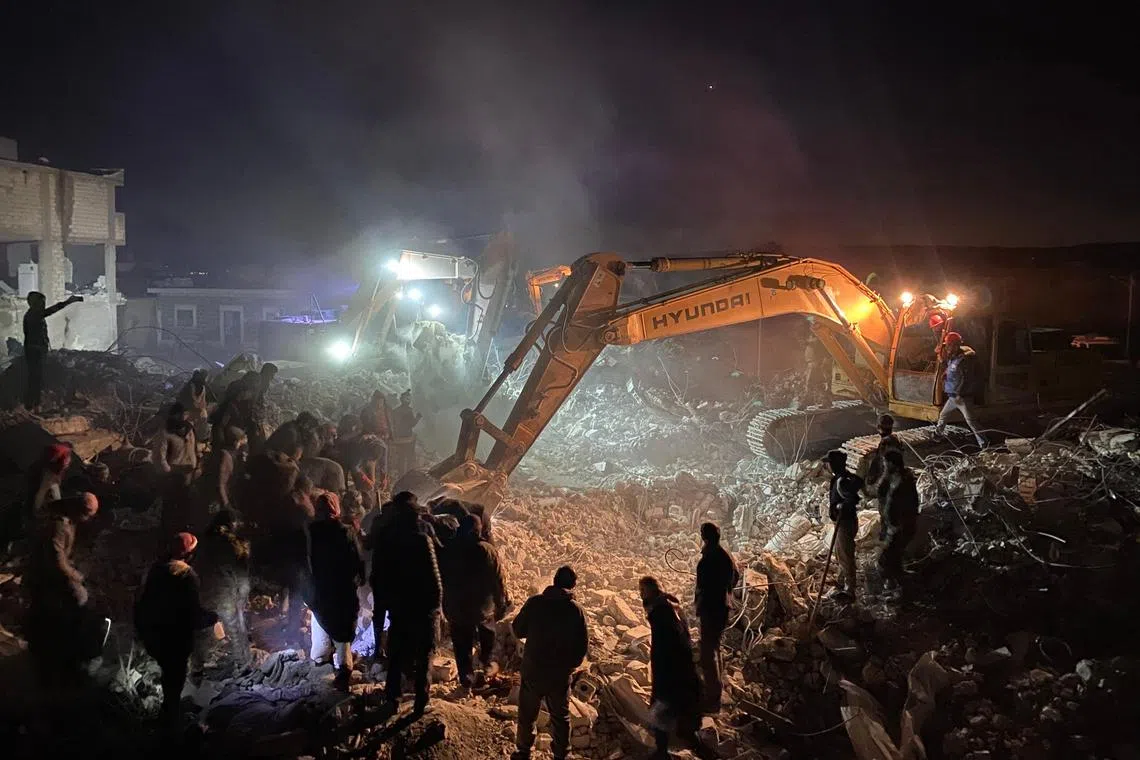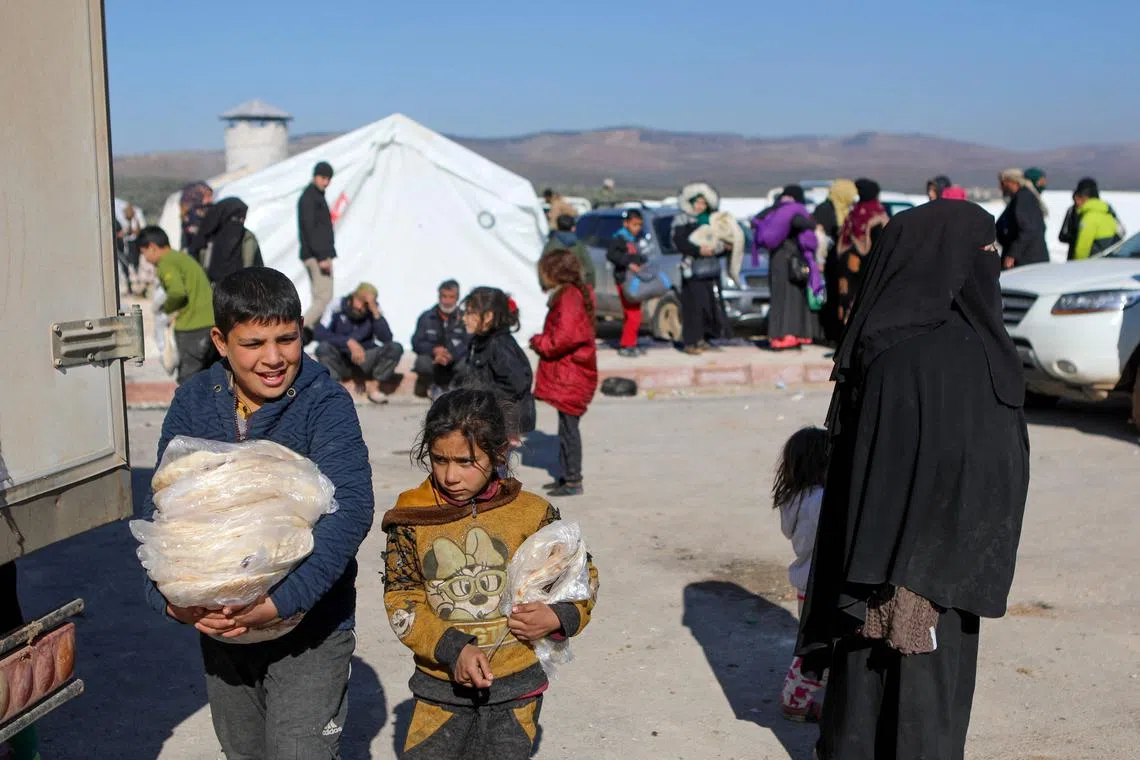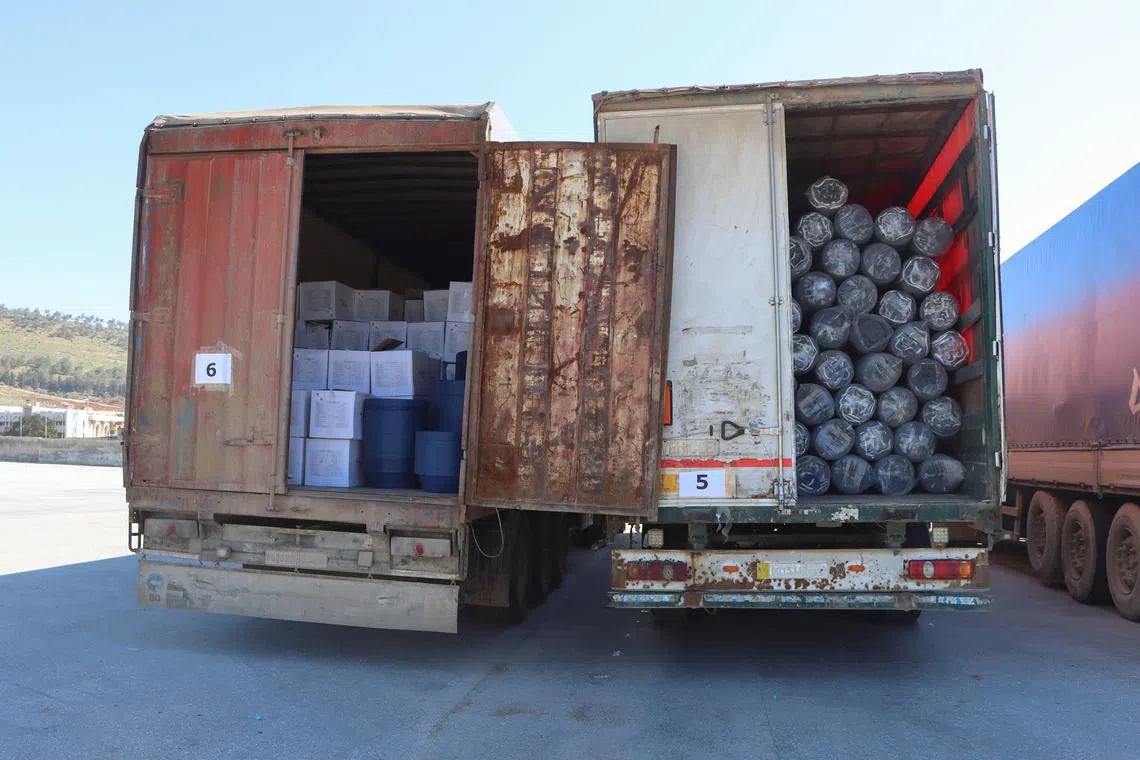As aid trickles into Syria, residents say too little, too late
Sign up now: Get ST's newsletters delivered to your inbox

Rescue workers look for survivors amid the rubble of a building in the rebel-held town of Jindayris, on Feb 8, 2023.
PHOTO: AFP
DAMASCUS - The first shipment of international aid
But survivors, rescuers and doctors expressed frustration that it was too little, too late. The six trucks of aid from the United Nations, organised before the quake hit, did not contain some of the most urgently needed supplies, such as food, and instead brought less critical items.
“Had international rescue teams come into Syria in the first hours or even the second day, there was a big hope that these people who were under the ruins could have been brought out alive,” said Mr Mohamed al-Shibli, a member of the White Helmets, a civil defence group that operates in opposition-held parts of Syria.
He demanded that the United Nations and global leaders send rescue workers and heavy machinery for moving rubble, dismissing the aid that had reached the region as useless to residents who had resorted to digging for survivors and bodies of loved ones with their bare hands.
“What will children under the rubble do with diapers?” he said, fighting back tears.
Monday’s earthquake
Those territorial divisions, and a host of other political obstacles stemming from a 12-year civil war that has still not ended, posed formidable challenges and fatal delays in getting international help to those who need it most.
Rescue groups, which have been working non-stop since Monday, have fanned out across the country in a race against time to save lives.
“Some people under ruins are sharing their wills with the team,” Mr al-Shibli said. “Under the rubble, they ask them to convey messages, they share names of their loved ones, then they die.”
The UN aid convoy into Syria had been stalled by road damage from the earthquake, which also affected local workers who verify and transport the aid.
The convoy entered Syria from Turkey, using the Bab al-Hawa border crossing, which for years has been the only passage for UN aid into areas held by opposition forces fighting the regime of Mr Bashar Assad, the country’s leader.
The trucks carried shelter materials and non-food items, according to a spokesperson for the UN Office for the Coordination of Humanitarian Affairs.
“This first shipment is a test,” said Mr Jens Laerke, a United Nations spokesperson, meant to ensure that the roads were passable. The organisation hopes to get as much aid into the north-west as soon as possible, he said.
More than 3,300 people in Syria died in the quake, according to the UK-based Syrian Observatory for Human Rights – a toll that has been steadily rising since Monday and is expected to keep climbing. Of those deaths, more than 2,000 were in the opposition-held parts of north-western Syria, according to the White Helmets.
In Turkey, the death toll surpassed 17,500
Nearly 11 million people in Syria have been affected by the earthquake, about 4 million of them reliant on aid agencies for basic humanitarian needs such as clean water and food, according to the United Nations.
The White Helmets rescuers have been working since Monday in a diminishing window to save as many people as possible before time runs out, often with their bare hands.
The pleas for more and faster aid were echoed by Syrian doctors, many of whom find themselves caught in a fresh humanitarian crisis after weathering more than a decade of civil war, which has devastated the country’s health care system.

Syrian children carry bread at a make-shift shelter for people who were left homeless, near the rebel-held town of Jindayris, on Feb 9, 2023.
PHOTO: AFP
“We had shortages of supplies before the earthquake; now our need has only increased,” said Dr Mohamed al-Abrash, a 60-year-old surgeon in the northern city of Idlib, where he has received hundreds of wounded since Monday.
Before the quake, Dr al-Abrash said his hospital staff were already in need of critical medical supplies like operating tables and bandages. Now, they needed more sophisticated equipment such as dialysis machines to treat an influx of patients suffering from renal failure from severe injuries.
Many survivors were refusing to return home as buildings continued to collapse, he said. Residents were building their own shelters in the streets, braving freezing temperatures.
“There are children dying from hypothermia,” he said. “We are forced to wait as people die in the streets,” he added. “We have no idea what is going on. We need politics set aside. We are in disaster.”
Before the quake, the United Nations had been sending daily aid convoys into the opposition-held north-west.
The earthquake has refocused attention on the ongoing civil war in Syria, which began in 2011 as a popular revolt against the Assad regime. The fighting has largely ceased and the war is essentially a stalemate.
But the ongoing conflict complicates the flow of aid into Syria, as most of it passes through Damascus, the capital, which is in government-held territory. The bulk of it comes via UN agencies, which sent US$2.13 billion (S$2.82 billion) to Syria last year, according to figures released by the organisation’s aid agency.

Trucks carrying humanitarian aid at the Bab al Hawa border crossing.
PHOTO: REUTERS
Because the Assad government tightly controls what aid goes to opposition-held areas, the cross-border aid deliveries from Turkey have been a lifeline for opposition-held areas in the north for years.
The European Union said Wednesday that it would work with the UN Office for the Coordination of Humanitarian Affairs to get aid to both opposition- and government-controlled areas of Syria after Syria’s government lodged a formal request for aid with the bloc.
The EU, a major donor of humanitarian aid to Syria, said it was committed to helping Syrians even though it has sanctions in place against the country.
Still, it is not only opposition-held areas that are struggling.
Dr Ghassan Fandi, head of a syndicate of doctors in regime-held areas of Syria, said international sanctions were preventing medical equipment from reaching Syrian hospitals, especially spare parts for Western-made machinery.
But a number of countries friendly with the Syrian government have sent aid to Damascus since the earthquake, including Iraq, Lebanon and Iran, which sent a plane Monday night with 70 tons of food, tents and medicine. NYTIMES


